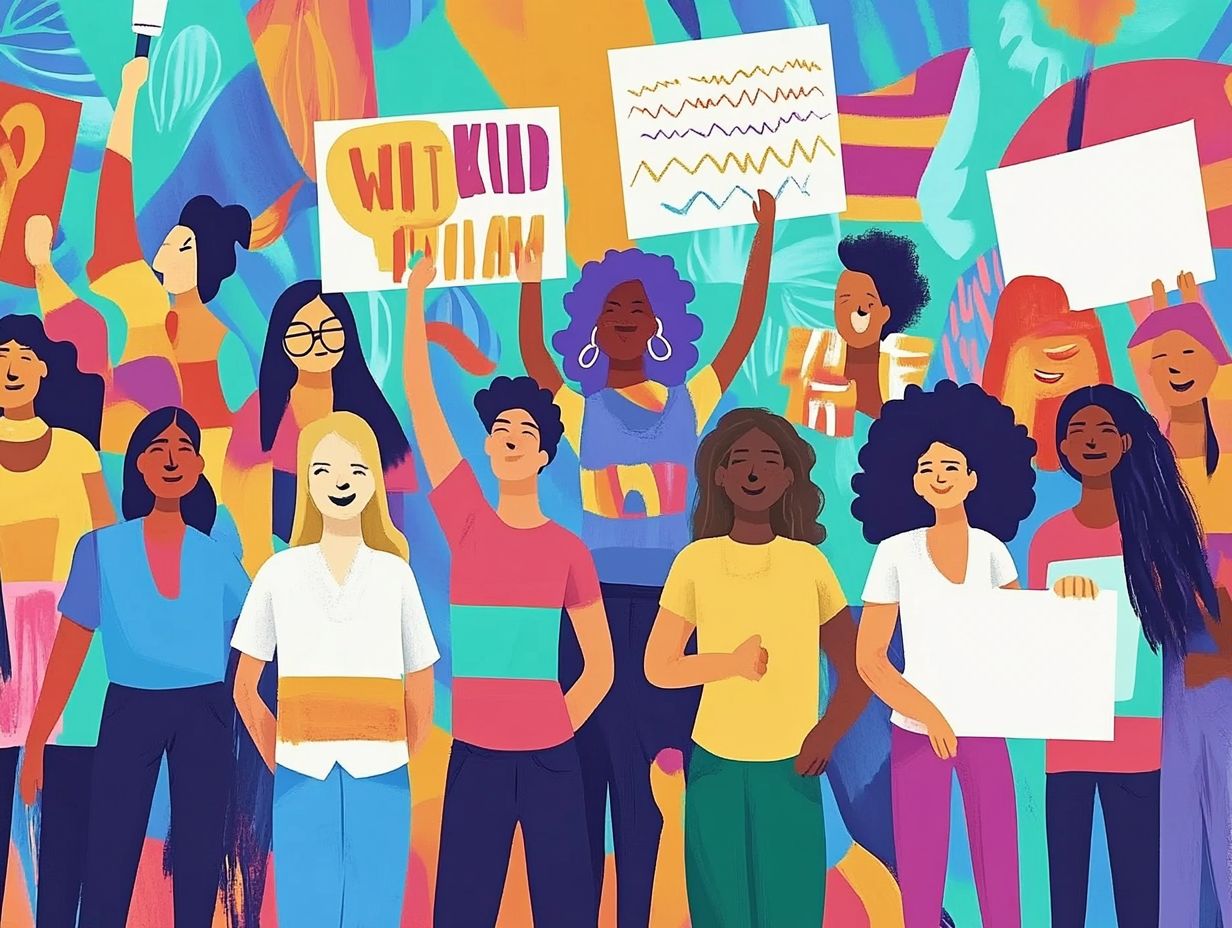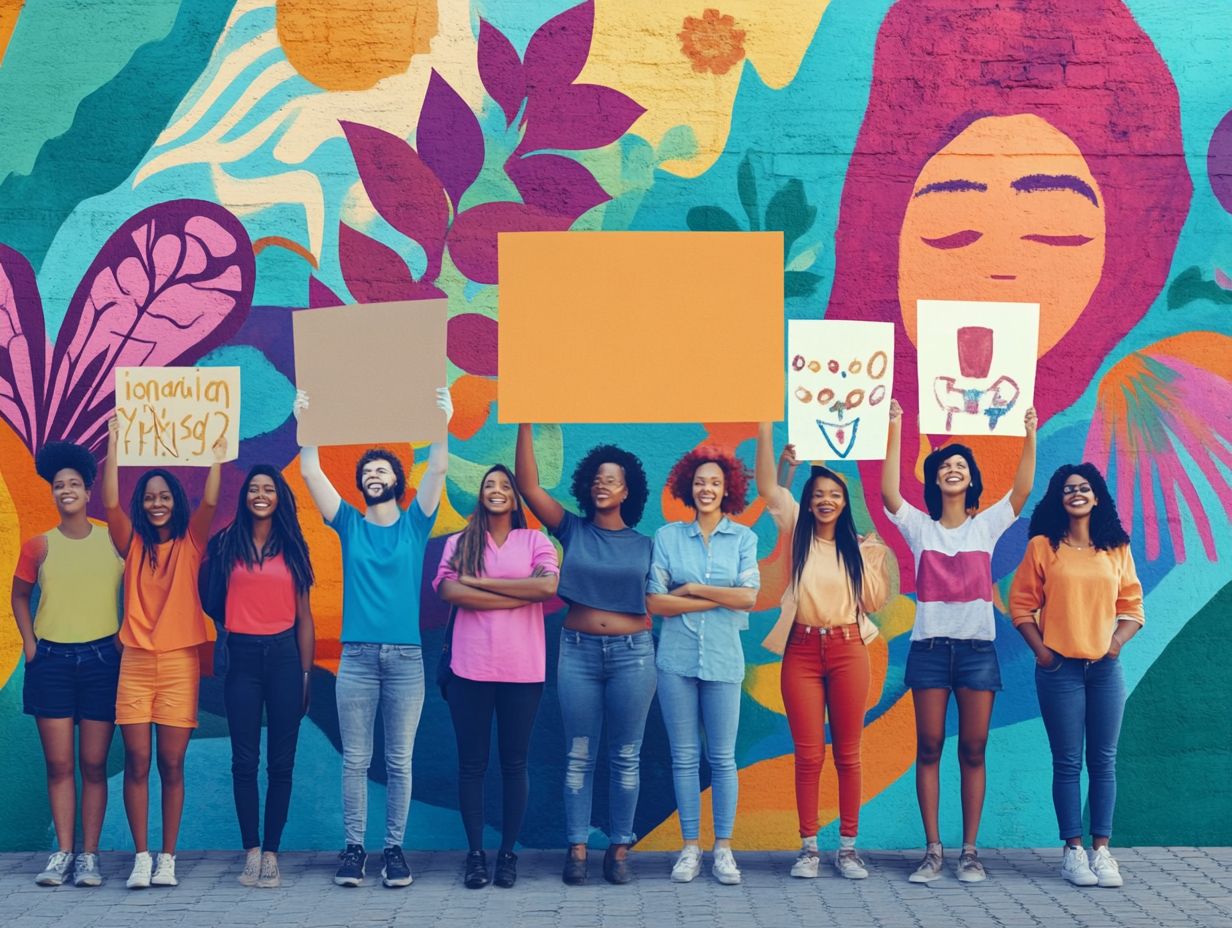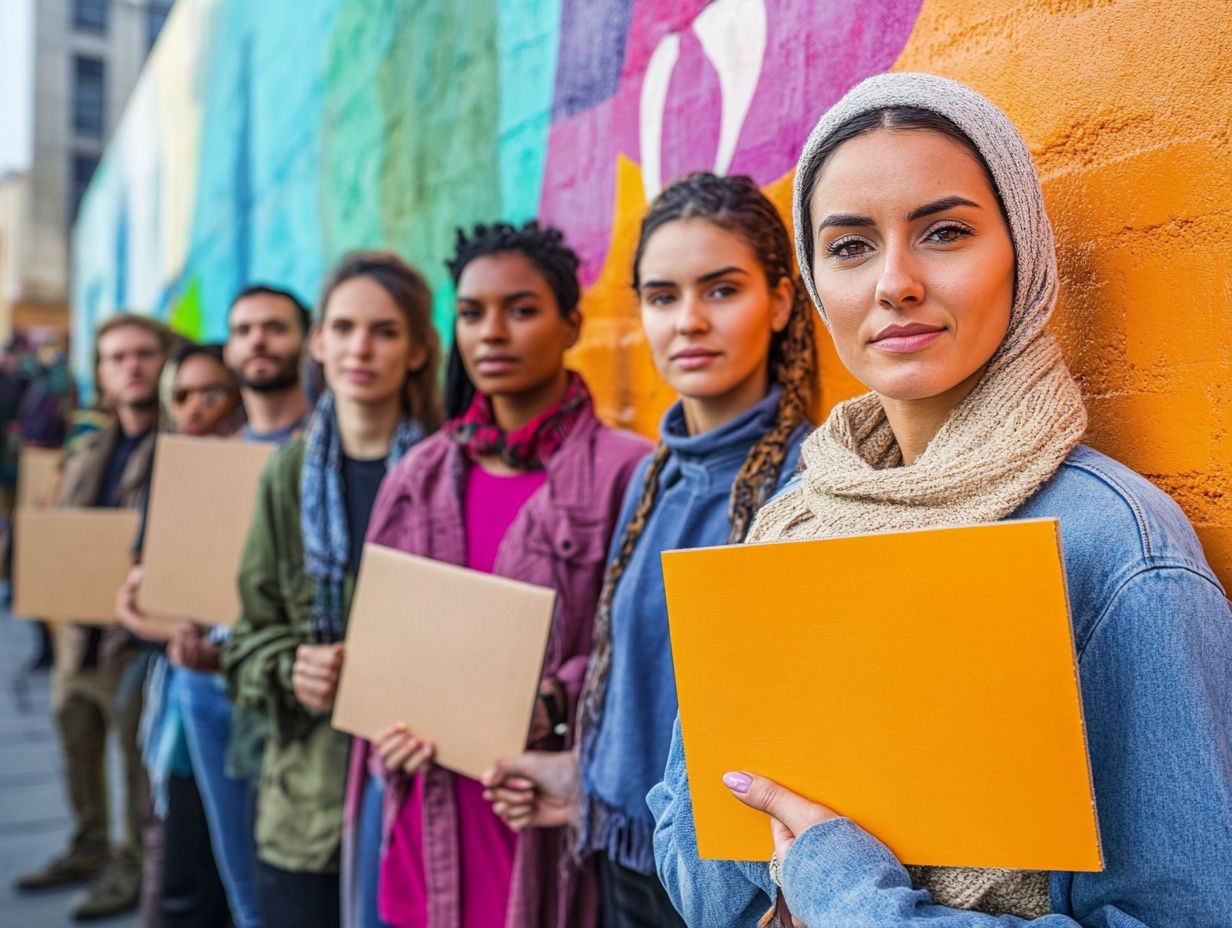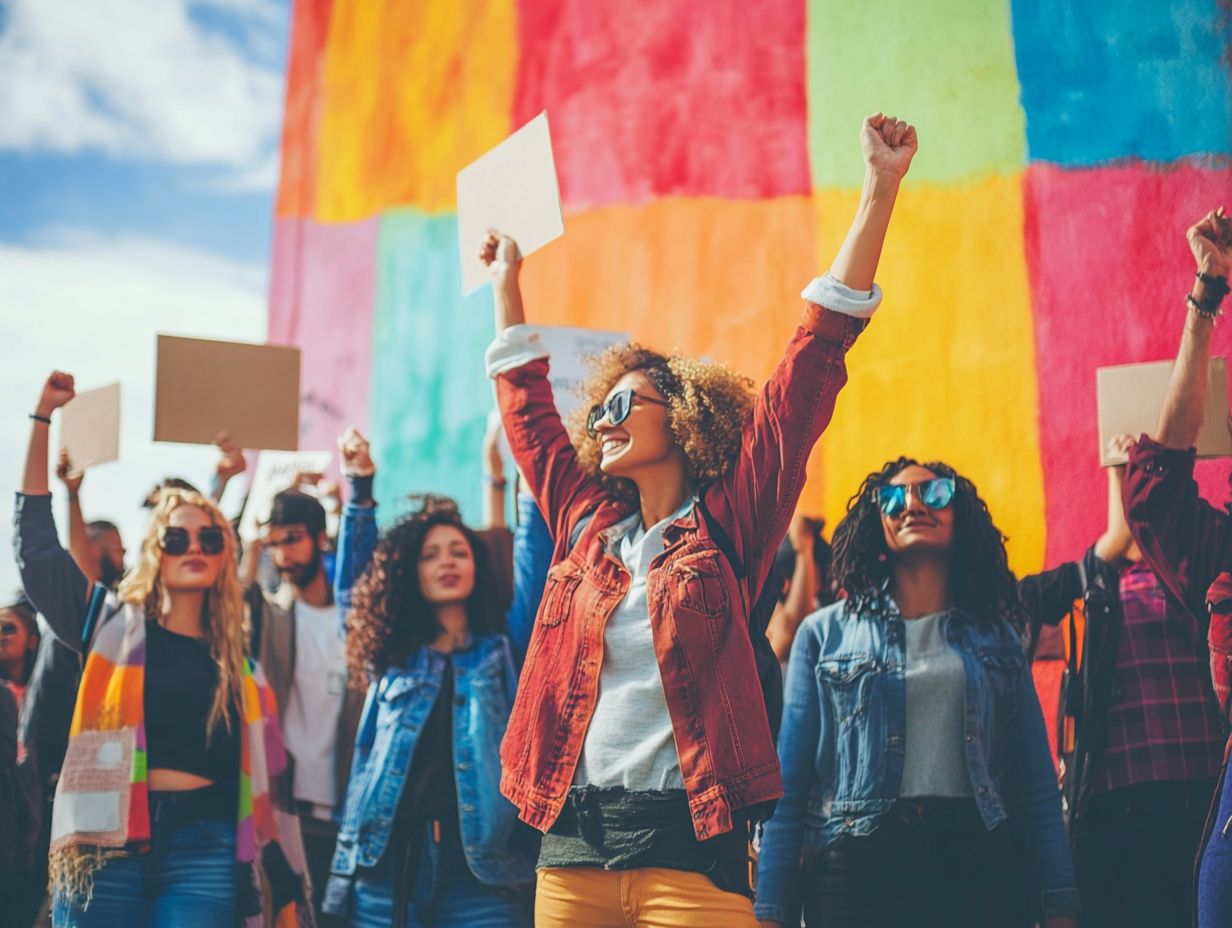Exploring 5 Types of Hate Crimes
Hate crimes are a troubling reality that impacts individuals and communities around the world. This article delves into five primary categories of hate crimes: racially motivated, religious, sexual orientation-based, gender-based, and disability-based hate crimes.
You’ll find detailed explorations of their definitions, common characteristics, and underlying causes. The article includes guidance for victims who are seeking justice and support, as well as discussions on preventative measures and the legal consequences that perpetrators face.
Understanding this topic is vital for everyone. Let s take action against hate crimes together!
Contents
- Key Takeaways:
- 1. Racially Motivated Hate Crimes
- 2. Religious Hate Crimes
- 3. Sexual Orientation-Based Hate Crimes
- 4. Gender-Based Hate Crimes
- 5. Disability-Based Hate Crimes
- What Are Hate Crimes and How Are They Defined?
- Frequently Asked Questions
- 1. What are the five types of hate crimes covered under the topic ‘Exploring 5 Types of Hate Crimes’?
- 2. How is a hate crime defined?
- 3. What factors contribute to the occurrence of hate crimes?
- 4. What are some examples of hate crimes?
- 5. What are the consequences of committing a hate crime?
- 6. How can we prevent hate crimes from happening?
Key Takeaways:

- Racially motivated hate crimes target individuals based on their race or ethnicity, intending to cause harm and instill fear.
- Religious hate crimes target individuals or groups based on their religious beliefs, leading to physical or emotional harm.
- Sexual orientation-based hate crimes target individuals based on their sexual orientation, often resulting in violence and discrimination.
1. Racially Motivated Hate Crimes
Racially motivated hate crimes represent a significant and troubling aspect of bias crimes. These crimes appear in various forms, such as physical assault, verbal abuse, and incitement to hatred, targeting individuals based on their racial or ethnic identity.
The societal harm and victimization from these acts are profound. According to the FBI and the U.S. Department of Justice, these incidents reflect deep-seated prejudice and challenge community safety and cohesion.
In recent years, statistics reveal that racial hate crimes account for a staggering 54% of all reported hate crimes, with African Americans often facing the brunt of these attacks. High-profile cases, such as the brutal assault of a Black man in 2020, underscore the urgent need for community mobilization and vigilant law enforcement.
These crimes impact not just individuals but entire communities, making it urgent to respond! The atmosphere of fear created can strain intercommunal relations. A robust response from local organizations and law enforcement is essential for fostering healing.
Various resources including legal aid, counseling, and community support programs play a crucial role in aiding victims as they work to rebuild their lives and restore their sense of security.
2. Religious Hate Crimes
Religious hate crimes are a deeply troubling form of hate-driven violence, where individuals or groups are targeted solely because of their religious beliefs. This leads to a spectrum of incidents, ranging from physical assaults to psychological harm, affecting not only the victims but also reverberating throughout larger communities.
The aftermath of these crimes often leaves profound emotional scars, creating an atmosphere of fear and mistrust among various faith communities. For example, the alarming rise in anti-Muslim incidents reported by the Southern Poverty Law Center following major terrorist attacks reflects underlying societal biases that can be dangerously amplified by misinformation and stereotypes.
Jewish communities have similarly faced a troubling surge in hate crimes, particularly in the form of vandalism and verbal harassment. A 2020 report indicated a 14% increase in such incidents. These disturbing trends highlight the pressing need for community education initiatives that foster understanding and tolerance.
By addressing the roots of fear and hatred, we can collectively work towards dismantling the cycles of violence that perpetuate these acts.
3. Sexual Orientation-Based Hate Crimes
Sexual orientation-based hate crimes are a pressing concern within the broader spectrum of hate crimes. These often lead to severe acts of violence such as physical assaults and grievous bodily harm targeted at individuals solely because of their sexual identity.
These distressing incidents inflict deep emotional and psychological scars on victims, sending shockwaves through families and communities. The statistics reveal that a significant percentage of these crimes spring from intolerance and prejudice, underscoring an urgent need for collective action.
Support groups and victim assistance programs are immensely important in this landscape, providing crucial resources and a safe haven for healing. By fostering connections among survivors, these organizations facilitate recovery and work tirelessly to raise awareness and advocate for justice, ultimately striving to dismantle the systemic issues that allow such hate to continue.
4. Gender-Based Hate Crimes

Gender-based hate crimes involve violence and discrimination aimed at individuals due to their gender identity. These acts lead to assaults, psychological harm, and wider societal issues.
Such crimes include physical assaults, verbal harassment, and unfair treatment, often affecting marginalized groups more. The impact on these communities is serious, creating an environment of fear and a lower quality of life.
It s urgent for communities to start meaningful conversations now! Supportive responses help victims and promote collective healing.
Victim support programs are essential. They guide individuals through trauma and help them seek justice.
5. Disability-Based Hate Crimes
Disability-based hate crimes are serious violations of civil rights. They manifest as violence and discrimination specifically against individuals with disabilities.
Statistics show that people with disabilities are often targeted by hate crimes, with nearly 60% experiencing intimidation or violence. This trend stems from deep-seated social attitudes that breed ignorance and fear.
Communities are stepping up to address this issue. They are launching resources and educational initiatives to raise awareness and promote inclusivity.
Victim assistance programs are crucial. They empower individuals to report incidents and receive the help they deserve.
What Are Hate Crimes and How Are They Defined?
Hate crimes are criminal acts driven by bias against a person’s race, religion, sexual orientation, gender identity, or other characteristics. This presents challenges for legal systems and community safety.
These crimes harm not just individuals, but create a climate of fear that affects entire communities. The FBI and the U.S. Department of Justice classify hate crimes to highlight their complexity.
By educating communities about these offenses, we foster awareness and empower individuals to report incidents. This proactive approach improves law enforcement responses and builds inclusivity.
What Are the Common Characteristics of Hate Crimes?
Hate crimes often target individuals based on perceived characteristics, resulting in violence or verbal abuse. These actions reflect deeper societal prejudices.
Such crimes are driven by fear, anger, and misunderstanding, often viewing others as threats. Research shows that offenders use stereotypes, dehumanizing their victims, which deepens community divides.
The motivations behind these behaviors can include a desire for control or the influence of extremist views. Communities affected by these acts face immediate trauma and long-term harm to social trust.
Fear and distrust can complicate healing and reconciliation among different groups.
What Are the Causes of Hate Crimes?

The causes of hate crimes are complex. They stem from a blend of psychological, social, and cultural factors that compel individuals to act on their biases. These actions are often ignited by societal incitement to hatred and systemic discrimination.
Societal influences significantly shape these attitudes. Media portrayals frequently reinforce negative stereotypes and cultural narratives that dehumanize certain groups. Such representations can create an environment where hostility towards differences feels acceptable.
The way people are raised in their communities can perpetuate these biases from a young age. This establishes a troubling cycle of prejudice. To address this alarming trend, community education is a vital tool. It fosters awareness and empathy while actively challenging harmful ideologies.
By promoting inclusivity and understanding, communities can unite to break this cycle and effectively reduce the occurrence of hate crimes.
How Can Hate Crimes Be Prevented?
Let s address this urgent issue head-on! Preventing hate crimes requires a comprehensive approach. This includes community education, proactive law enforcement, and strong victim support systems. Together, these create an environment that actively discourages prejudice and discrimination.
You can implement awareness campaigns to educate residents on the harmful effects of hate crimes. These initiatives can foster understanding and empathy among diverse groups while promoting meaningful dialogue and collaboration.
Establishing support groups offers a safe haven for victims to share their experiences. These groups provide access to healing resources, while clear legal protections ensure that offenders face accountability. Report hate crimes right away to ensure swift action! Doing so not only addresses individual incidents but also enriches the broader understanding of the problem.
What Are the Legal Consequences for Committing a Hate Crime?
The legal consequences for committing a hate crime can be quite severe. Enhanced penalties under federal statutes classify such acts as particularly egregious offenses that require stringent legal responses.
Federal laws, such as the Matthew Shepard and James Byrd, Jr. Hate Crimes Prevention Act, establish a protective framework for individuals based on their race, color, religion, ethnicity, sexual orientation, gender identity, or disability. States also have their own laws, which can differ significantly in definitions, reporting requirements, and penalties.
Some states may impose additional consequences, such as emergency protective orders that victims can seek to ensure their safety during criminal proceedings. Many jurisdictions also implement sentencing enhancements that result in longer prison terms for offenders. This reflects the understanding that hate crimes cause greater harm to communities and society as a whole.
How Can Victims of Hate Crimes Seek Justice and Support?
Victims of hate crimes have various pathways to seek justice and support. This includes filing police reports, accessing victim assistance programs, and utilizing community resources tailored to address hate-based violence.
To navigate these processes effectively, it s vital to document the incident thoroughly. Doing so can significantly enhance your case. Connecting with local advocacy groups can provide essential guidance and emotional support, helping you understand your rights and options.
It s equally important to reach out to legal experts who specialize in hate crime cases. These professionals can offer critical insights into the legal frameworks available for pursuing justice.
Beyond immediate legal assistance, engaging with community organizations allows you to build a network of solidarity. Here, you can find empowerment and shared experiences, further promoting awareness and prevention of hate crimes.
Frequently Asked Questions

1. What are the five types of hate crimes covered under the topic ‘Exploring 5 Types of Hate Crimes’?
The five types of hate crimes covered under this topic are racial, religious, sexual orientation, disability, and gender-based hate crimes. To learn more about these categories, refer to the understanding hate crimes: definitions and examples identified by the FBI in their Uniform Crime Reporting (UCR) program.
2. How is a hate crime defined?
Hate crimes are crimes motivated by bias or prejudice. They target individuals, groups, or property based on race, religion, sexual orientation, disability, or gender identity.
3. What factors contribute to the occurrence of hate crimes?
Multiple factors contribute to hate crimes. These include societal tensions, political climates, and misinformation about certain groups.
4. What are some examples of hate crimes?
Examples of hate crimes include physical assaults, threats, vandalism, and harassment. They can also involve verbal abuse and discrimination.
5. What are the consequences of committing a hate crime?
The consequences can include arrests, fines, and imprisonment. Hate crimes also cause emotional and psychological harm to victims and their communities.
6. How can we prevent hate crimes from happening?
We all play a part in stopping hate crimes. By promoting education, tolerance, and acceptance, we make our communities safer.




